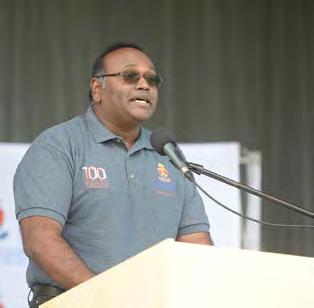
3 minute read
Technology as an Antidote to COVID-19 Learning Fatigue
material. Telephonic tutoring was subsequently provided to two students, covering two modules they had in common and an additional four for one of them. Both students gained examination admission. In terms of study material, lecturers uploaded it on Google Drive, from where it was distributed by Education Innovation. Students had to complete application forms for laptops and data. The advisor provided students with the details regarding the application process. Information Technology Services reported that 109 students eventually received loan laptops. The faculty was also aware of students’ need for data. In the course of the year, Information Technology Services offered data bundles five times, and hundreds of law students took advantage each time.
Professor Duncan stressed that ‘UP’s most important resource was its lecturers’, and he expressed ‘great appreciation towards academic staff whose commitment, resourcefulness and innovation resulted in a successful academic year, albeit in extraordinary circumstances’. Much of what the Vice-Principal said resonated with members of the forum. Their experience of additional workload on clickUP in the second quarter was supported by data from the clickUP analytics system, which showed lecturers to be very active online. and digestible so students could grasp difficult concepts and acquire the required legal knowledge and skills. This approach demanded clear delineation of the module into the ‘prepare’, ‘engage’, and ‘consolidate’ phases.
In 2020, for the sake of sustainability and long-term application, a computer game was developed and implemented that could be used to consolidate a task or as a comprehensive lecture, thus also aligning with the ‘engage’ part of hybrid learning. Although this project commenced before the pandemic, it took on a
new meaning for the module after the move to emergency remote teaching.
The game, Saving Callisto: Two Presidents and a Grudge, follows the story of an international legal advisor called to provide legal advice to a female president in a war-room situation. The student takes on the role of the advisor and has to guide the president, whose state is faced with a potential biochemical attack from an opposing state with which they have a strained history. The game was conceptualised, written and designed by Dr Martha Bradley, Professor Annelize Nienaber and Ms Jessie Phyffer in the Department of Public Law, in collaboration with
Professor Duncan concluded his session by thanking lecturers and students for their positive approach towards ERT and the sacrifices they had made during the past academic year.
Scenes from Saving Callisto
Until recently, the undergraduate LLB module Public Law 320 (PBL 320), presented by the Faculty of Law (UP Law), was considered a high impact module (HIM). In order to shift the module’s precarious status, the PBL 320 lecturing team in the Department of Public Law sought alternative delivery methods in line with the University’s Teaching and Learning Policy, while making it more accessible, chunky the faculty’s education consultant, Ms Faith Mathibedi. The game was developed by Mr Dennis Kriel, a senior instructional designer and educational technologist in the Department for Education Innovation.
The game is designed to be engaging, relatable and educational, while simultaneously taking advantage of Generation Z living and breathing the digital world. The objective is to have the student virtually and creatively occupy the realworld position and witness that the outcome of their legal advice could reverberate in potential real life.
The PBL 320 team realised that using trendy technology would not only meet students on their level, but it was also vital in preparing students for their future workplaces in the Fourth Industrial Revolution. Universities can no longer ignore that the workplace is changing. Court hearings are held virtually in response to the pandemic. Court documents are lodged online. Consultations are virtual. It is imperative that academics address the changing nature of the workspace and prepare students for the traditional and future workplace. Gaming and virtual reality equip us to do so.
In addition to the game, the PBL 320 team expanded on its digital offering in two ways.
Firstly, in order to infuse technology into the ‘prepare’ phase of learning efficiently, the team created Powtoons, which are short animated videos that take complex international law concepts and break them down into digestible pieces of information. The team aimed to familiarise students with the concepts before their ‘engage’ session to ensure that they got the most out of their lectures. The Powtoons were written by Dr Martha Bradley and Professor Annelize Nienaber, the two primary lecturers for PBL 320, and designed and created by Ms Jessie Phyffer, the academic associate for International Law.










